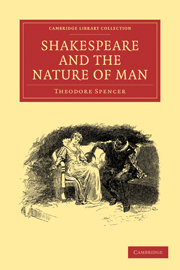Book contents
- Frontmatter
- Preface
- Contents
- SHAKESPEARE and THE NATURE OF MAN
- I Man in Nature: the Optimistic Theory
- II Man in Nature: the Renaissance Conflict
- III The Dramatic Convention and Shakespeare's Early Use of It
- IV Hamlet and Troilus and Cressida
- V Othello and King Lear
- VI Macbeth and Antony and Cleopatra
- VII Shakespeare's Last Plays
- VIII Literature and the Nature of Man
- Index
VIII - Literature and the Nature of Man
Published online by Cambridge University Press: 07 September 2010
- Frontmatter
- Preface
- Contents
- SHAKESPEARE and THE NATURE OF MAN
- I Man in Nature: the Optimistic Theory
- II Man in Nature: the Renaissance Conflict
- III The Dramatic Convention and Shakespeare's Early Use of It
- IV Hamlet and Troilus and Cressida
- V Othello and King Lear
- VI Macbeth and Antony and Cleopatra
- VII Shakespeare's Last Plays
- VIII Literature and the Nature of Man
- Index
Summary
In the second chapter we saw that in Shakespeare's age the universal problem of the difference between man as he should be and man as he is, between the theoretically good appearance and the actually evil reality, was being felt by many people besides Shakespeare himself. Many circumstances, intellectual and otherwise, at the end of the sixteenth century combined to produce one of those periods when, with a sudden shock, men see themselves in new relationships and become aware that the new lights they have discovered only make the surrounding darkness more portentous and profound. The consequences of such a situation can be various. Some people may try to retreat into the comforting limits of the old concepts that have been overthrown; others may excitedly pursue, regardless of order, the fresh illumination; others may invent new formulae to include the new facts; others may escape into irrelevancies or fictions; others may extend their comprehension to say, “Yes; this is true; this is how things are; let us be thankful for that which is.” Religion, science, philosophy, romance and art—each (though of course none can be entirely separated from the others) has its answer, as each had its apparent answer at the beginning of the seventeenth century, the century that formed, as we can see in looking back at it, our own civilization and our own concept of the nature of man.
- Type
- Chapter
- Information
- Shakespeare and the Nature of Man , pp. 203 - 224Publisher: Cambridge University PressPrint publication year: 2009First published in: 1943

